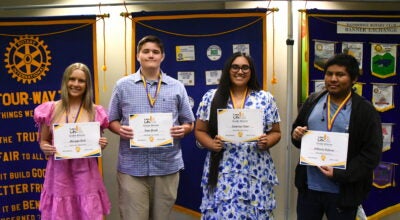V-E Day in bittersweet Budapest
Published 7:55 pm Friday, May 7, 2010
A couple of years ago I presented a research paper at a political science conference held in Budapest, Hungary.
I was accompanied on the trip by my 78-year-old mother, Rose. (Sorry for revealing your age, Mom!)
For several years she had been the sole caregiver for my stepfather, Col. Frank Cappelletti, who was suffering from Alzheimer’s. After that long, heartbreaking, and ultimately losing battle, my mom was desperately in need of some rest. I thought a little vacation would do her a lot of good, and since she had never visited Eastern Europe, I invited her to go along with me to Hungary.
One night, my mother and I were having dinner in a lovely little restaurant across the street from our hotel in Budapest. The place specialized in traditional Hungarian cuisine, complete with gypsy violinists and festive dancing girls dressed in old-fashioned costumes. We had eaten there before, but on this night it was especially crowded, with several tables of senior citizens and their families enjoying a special night out.
During a break between musical sets, an elderly little lady with a glass of brandy in her hand began dancing from table to table. With a thick, unmistakably French accent, she exuberantly toasted each table’s occupants with a loud cry of, “Libération! Libération!”
“Well, I think Grandma over there has had enough liqueur for the evening,” I whispered to my mom.
No sooner had I said that, than she made her way to our table.
“Libération! Libération!” she shouted. Her old eyes sparked with unrestrained joy as she laughed and lifted her glass to us in celebration.
The sweet
With a condescending smile, I returned her toast with my wine glass and silently expressed the wish that she would move on. But my mother was intrigued and asked her in halting French what was the special occasion that merited such merriment.
It was then that we noticed a blurry, blue number tattooed on her fragile little arm. It was the infamous Identifikationzahl tattoo that the Nazis inscribed on concentration camp inmates’ forearms as a means of positive identification.
She had been a prisoner at Auschwitz, she said. Her sister and grandmother died there. But she survived because, as a young and relatively healthy girl, she was valuable as slave labor.
In January 1945, as Russian troops approached from the east, the Germans force-marched her and thousands of other prisoners to the west. This night, V-E Day (Victory-in-Europe Day), was the 63rd anniversary of their liberation by American troops. She and a couple of other camp survivors and their families had chosen this restaurant to celebrate the occasion.
My mother and I were stunned. A wave of shame swept over me for my earlier dismissal of the woman. We talked with her for a few minutes, then she moved on, intent on sharing her joy with everyone else in the place.
I maintained my composure for a while, but when the gypsy violins turned to some sad songs, the tears began to well up in my eyes. I told my mother I needed a cigarette and left the restaurant so she would not see me cry. I stood out there on the sidewalk for several minutes, contemplating the old woman’s irrepressible gaiety despite the incredible horror that she had endured. That bittersweet combination of triumph and tragedy, happiness coupled with sadness, was a theme I saw over and over again in Budapest.
Pondering the vibrant spirit of that death camp survivor eventually gave me with a good feeling about my service in the military. As an old infantryman, I felt a little indirect pride that “my” U.S. Army had liberated her. Good feelings about our military were in short supply at that time because of the scandal in Abu Ghraib Prison, and it was satisfying to remember that, sometimes, wars are fought for the right reasons.
But fate wasn’t letting me off the emotional rollercoaster ride just yet. I started chatting with an elderly German fellow who had also ducked out of the restaurant to enjoy a quick cigarette. As usual, we engaged in the typical griping about smokers being banned from restaurants.
The bitter
But then the old man started complaining about all the attention being showered on the concentration camp survivors! I was appalled beyond description. Was this some unrepentant Nazi I was chatting with?
But then the old man explained himself. During the war he had been a young boy living in Hamburg. In late July 1943, approximately 3,000 Allied bombers attacked his city. The bombing was purposely designed to create a “fire storm,” a literal hurricane of flame that incinerated the entire center of the city. The heat was so intense that even people in bomb shelters were roasted alive. The raid left 50,000 civilians dead, mostly women and children, and more than a million homeless. Hamburg was bombed 69 more times during the war.
“No one remembers, much less mourns, the “holocaust” that I and my people have suffered,” he said.
Well, it was just plain impossible for me to have the same sympathy for the German man that I had felt for the Jewish lady. But intellectually I understood what he was saying: The little children of Hamburg were just as innocent as the little children of Auschwitz.
My mind drifted back to the year I spent teaching in Hiroshima, Japan. I remembered visiting the ruins of a middle school that had been destroyed by the atomic bomb. Located just a few blocks from “Ground Zero,” the only thing left of the school was a dozen or so bricks that once formed the corner of one building. Every child attending school that fateful morning was instantly incinerated in one blinding flash of atomic fission.
Now, as a military historian, I know full well that Hiroshima was a legitimate military target and that its bombing probably saved many other lives by shortening the war. And World War II itself is consistently recognized as the most justified of American wars.
But once again I was engulfed with conflicted emotions. Why is it, I wondered, that no matter how noble the cause, war always seems to take its greatest toll among the innocent? The bittersweet mixture of sadness and joy voiced by the gypsy violins began to make more sense to me.
Later that night, after my mother had retired to her room, I met up with some of my conference colleagues for a nightcap. After a while, we began sharing stories about our stay in Budapest.
One colleague of mine, a female professor from Slovakia, recommended that we visit the “Terror House” museum in downtown Budapest. It wasn’t one of those museums, like the Tower of London, that show delightfully gruesome but historically distant instruments of medieval torture. No, this was a place of torment and execution that operated within the living memory of many residents of Budapest.
Housed inside a large and elegant downtown building, the museum was at one time a prison operated by the Hungarian Nazi party. Known as the Arrow Cross, these anti-Communist fanatics imprisoned, tortured and executed hundreds of political and racial enemies during the period 1944-45. When the city was “liberated” by Soviet troops in early 1945, the communists took over the building and continued the very same horrific activities there against their own “enemies of the people.”
“The torture tables the communists used were the same ones used by the Nazis. The torture tools they used were the same ones used by the Nazis. The murder techniques they used were the same. The only thing that changed was the flag flying over the building,” said my colleague.
The more I learned of Budapest’s somber past, the more I appreciated the complex, bittersweet mixture of sadness and hope that typifies the Hungarian character. The horrifying results of political division and ethnic hatred especially stood out in my mind.
The lessons
When I returned home, I contemplated what this all meant for us Americans. As often happens with foreign travel, being physically and culturally distanced from ones homeland sometimes gives a person a new perspective in understanding their own country.
My thoughts turned to the presidential election that was going on at the time. For the first time, an African-American candidate had a reasonable chance of being elected to our nation’s highest office. But public opinion polls indicated that 10 to 15 percent of the American electorate would not vote for a black person, regardless of their qualifications. Here in the Old South, the numbers were even higher.
Obama’s eventual election as president hasn’t changed things much. Indeed, I wonder whether it may have pushed some people over the edge. Some people want to “take back America,” as if our country was theirs and theirs alone to own, as if all citizens did not have an equal birthright to political expression. Goading them on are the shrill voices of demagogues, whose willingness to exploit the basest of fears and prejudices to satisfy their own ambitions knows no bounds.
In Washington, the politics of demonization and obstructionism have replaced reasonable political debate and compromise. Even homegrown terrorism is on the rise, with individuals cloaking their murderous intents with veils of patriotism and religion. Our nation seems to be driving down a very dangerous path indeed.
Seeing firsthand what ethnic hatred and political radicalism did to Hungary makes me pray that our country will return to civility and moderation, and that some future historian will never have to ponder the bittersweet tragedy of America in the early 21st Century.





